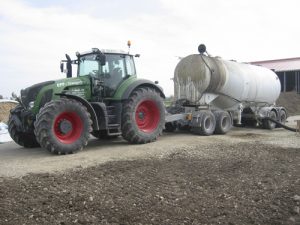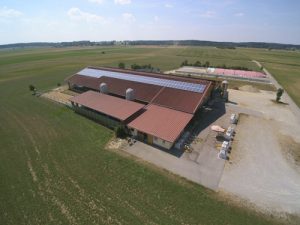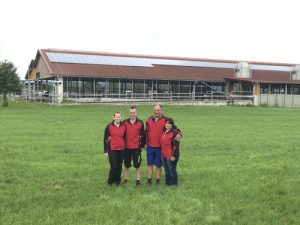Today, the Kögel farm keeps 150 dairy cows in the stable outside the village. Mr. Kögel follows a consistent concept of optimizing his farm with an absolute focus on the cow herd.
There is neither a machine hall nor significant technology for cultivating the land at the farm.
Both young cattle as well as circular flow of resources on the land are cooperatively done by third parties.
Family Kögel – Mr. Kögel, his wife and son take care of the dairy cows, milking, feeding, fertility, milk yield and calves until the earliest possible sale. The daily operative working hours are around 2 to 3 hours in the morning and evening. Every third Friday is a day off for one of the three family members.
Basic information
Area: approx. 25ha
Mr. Kögel and his wife operated the farm from 1995 onwards and they initially worked part-time. By 1998, they ex- panded the dairy herd from 25 to 40.
Immediately after acquiring the farm, they handed over the complete land management to a regional machinery ring. The only decision which remained under their control was the date for the harvest. All of the other activities were decided by the contractor and / or the other farmers participating in the machinery ring.
The farmers wanted to devote their time to focus on dairy cattle husbandry and maintaining the highest quality standards in the stable.
According to this principle, the family business was developed consistently and expanded after its relocation in 2008. The farm has currently 150 dairy cows. Both farmers are in their early 50’s. They have a 22-year-old son who is currently finishing his master’s degree in agriculture and plans to enter the business soon. However, he also wants to gain some experience working on other farms. This additional experience can be secured from working on a farm in which the Kogel’s already engage in some element of co-operation.
The company has gained valuable experience by cooperating with other colleagues. It cooperates exclusively in the area of primary production, with a strong emphasis placed on animal health; quality produce production; and main- tenance of stable. In addition to their own performance in the barn, the highest quality of feed and straw is provided to the animals.
Cooperation in production:
- Feed storage
- Management of grassland by the regional contractor.
- For the past 4 years, all the growth is dried in grass pellets. For this purpose there is close cooperation with the regional feed drying provider.
- The corn demand is covered by cooperating with a large arable farm and another smaller arable farm.
- For some years shredded maize has been produced instead of silage maize, making it easier and more efficient for cows to digest. The immediate change to this effect was only possible through cooperation with a contractor who also holds the appropriate harvesting technology.
- Cooperation in manure spreading: there is also a meeting between the farmers about the application of manure at the beginning of each year in order to clarify the output requirement. This is to ensure that farm complies with the strict regulations with respect to the spreading of liquid manure and artificial fertilizer. However, market conditions are changing. If the customer used to pay for the liquid manure in the past, today the tendency is in the opposite direction, as many companies in the region face a disposal problem.
- Dairy farming
- Since 1998, no new cattle have been reared on the farm, but the herd has been supplemented in close cooperation with a breeding association.
- The veterinarian will come to the farm on a weekly basis - Wednesday morning between 08.00 and 10.00. If the vet is unable to attend, he is obliged to provide ample notice.
Due to the cooperation described above and the absolute focus on the key parameters of a milk producer who does not sell independently from the world market through a dairy, the company can be structured. The daily working hours and work tasks are clearly defined.
All of the co-operation activities on this farm are based on verbal agreements and recommendations. These activities are based on mutual trust and high quality standards on both sides. If this cannot be maintained, the company is always open to implement an alternative plan.
Mr. Kögel is always open to change. He sees his farm as a sustainable livelihood. The independent operation with dairy cows on this location remains viable - regardless of the way in which the land is managed.
Interestingly, the only planned cooperation which was written as a contract did not come fruition. This related to the building of stables outside the village. There were plans for the joint construction and operation of the stable with another individual. The planning was completed - including fully regulated distribution issues and mutual hourly payment to the shareholders. In the end, however, the foreseen partner lacked confidence in the joint project. Mr. Kögel proceeded to implement the project on his own initiative and he is very content with the outcome.
The following skills and competences were identified by Mr. Kögel as being essential requirements for farmers engaging in cooperation activities:
- Similar work ethics
- Criticism must be possible
- forward thinking
- communication
- transparency
To date, the Kögel’s have only had positive experiences with respect to their co-operation and collaboration activities. It is critically important to have clear agreements and careful selection procedures for partners.
The partnerships are very stable without creating too much dependency. This keeps the company open for change and constant adaptability.
Advice/Recommendation
"Cooperation? Of course - around the core company, but beware of a full merger of the core activity, as it creates deeper ties and dependencies!"
Queries/Questions
- Even if a farmer is very successful in all his/ her cooperation activities, the advice offered in this case study suggests a to complete merger of core activities should be avoided. Do you agree with this advice?
- This farmer has engaged in several cooperation activities along production cycle. What are the benefits of working collectively?



 Čeština
Čeština  English
English  Français
Français  Deutsch
Deutsch  Italiano
Italiano  Slovenščina
Slovenščina  Español
Español 


